Department Events: Fall 2024
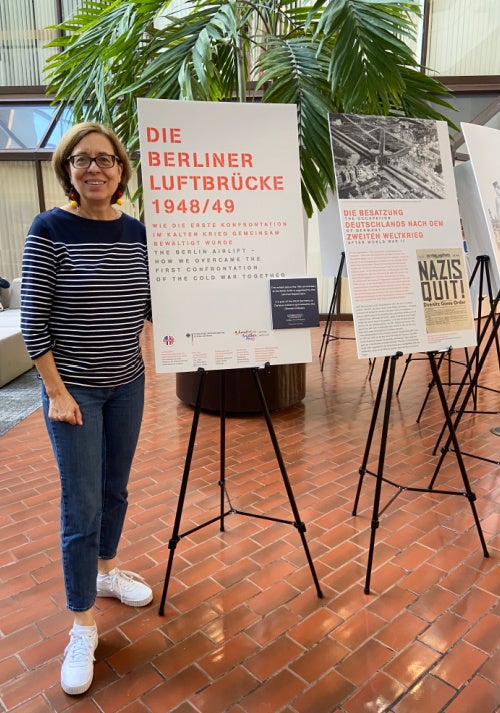
Prof. Anja Banchoff with the Berlin Airlift poster display
The German Department is proud to have presented a large variety of events during the Fall 2024 semester!
During the first week of October, the German Department, with the support of the German Embassy, arranged a poster exhibit in the ICC Galleria to commemorate the 75th Anniversary of the Berlin Airlift. From June 1948 – May 1949, British and US Allied Forces provided vital supplies to the people of West Berlin after the Soviet Union had blocked all land access. This critical chapter in US-German relations continues to resonate, decades later, as a vital example of solidarity and cooperation in support of peace and democracy. This event was organized by Professor Anja Banchoff.
On Thursday, October 10, the German Department hosted a lecture with visiting Max Kade Professor Dr. Steffen Siegel titled “What Was the Lure of East Berlin? Sibylle Bergemann and the Face Value of Photo Books.” Counted among the most eminent European fashion photographers of her time, Sibylle Bergemann contributed several street photography series that contradicted the official idea of Socialist realism. Her photographic portrait of a murky, unpleasant, and sometimes almost rotten city raises questions: What sort of idiosyncratic seduction is at play here? How could the manifest bohemian style of Bergemann’s photographs fit in the official image of a vibrant half-city rebuilt as a modernist Socialist capital? What is the face value of such an anti-official photo book that went to the printing press three times in the 1980s? Finally, what does it tell us about the general strategies for publishing photo books in the GDR?
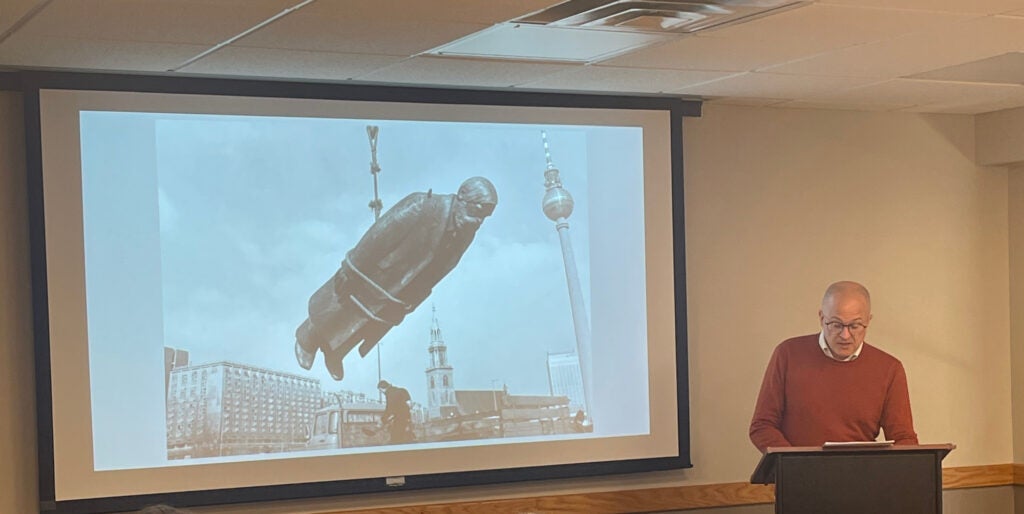
Dr. Steffen Siegel during his lecture on October 10, 2024
On October 15, Prof. Dr. Michael Jäckel, former president of the University of Trier (2011–2023) and sociologist, visited Georgetown University’s German Department for several enriching days. During his visit, Prof. Jäckel delivered a thought-provoking lecture titled “To Demonstrate an Intellectual Methodology – What Constitutes a University?” Drawing on his extensive experience, he shared unique insights into the historical evolution and future direction of universities.
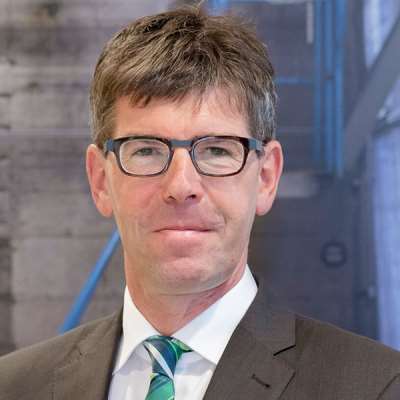
Prof. Dr. Michael Jäckel
Prof. Jäckel also met with graduate students during a lively brown bag lunch, where discussions revolved around shifting perceptions of time in contemporary society. Additionally, undergraduate students had the chance to learn from his expertise in reforms to postsecondary education in Germany during a visit to Prof. Verena Kick’s Text in Context class.
As a longtime friend of the German Department, it was a pleasure to welcome Prof. Jäckel back to campus. His visit underscored the enduring ties between Georgetown University and the University of Trier.
On October 18-19, 2024, the German Department hosted a workshop titled Researching Digital Storytelling: Methods and Applications, organized by Anna De Fina (Italian Department), Marianna Ryshina-Pankova (German Department), and Alexandra Georgakopoulou (School of Education, Communication & Society, King’s College, London). The workshop was funded by the Georgetown International Collaborative Grant and brought together internationally renowned researchers from Aarhus, London, Baltimore, and Washington, DC, and graduate students to explore the world of digital narratives. The workshop featured presentations on the use of digital stories in a variety of contexts. One strand of the workshop focused on how digital platforms such as TikTok, YouTube, podcasts, as well as synthetic media that creates the deepfake transform the way stories are told, shared, and analyzed. The other strand examined applications in instruction and the educational potential of digital stories. New methodological approaches and tools that shape the study of digital narratives were discussed. As digital storytelling continues to transform communication, identity-building and teaching and learning, this workshop was a valuable step toward fostering collaboration and advancing research in this rapidly evolving domain.
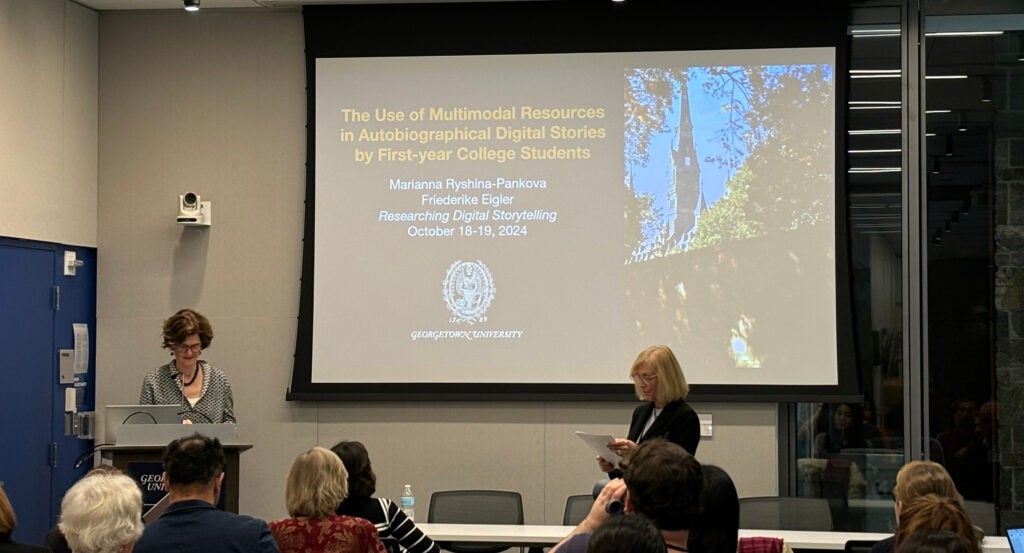
Dr. Friederike Eigler and Dr. Anna De Fina during the Researching Digital Storytelling Symposium
The German Department welcomed a presentation by visiting researcher Sandra Schell (University of Heidelberg) on October 22. Her talk was titled “How to Handle the New Occupiers Margret Boveri’s Amerikafibel and U.S. ‘Reeducation’ Politics” and focused on Margret Boveri’s Amerikafibel as a seminal example to study how intellectuals controversially addressed the political, ideological, and cultural transformation of post-Nazi Germany under the auspices of “reeducation.” The U.S. “reeducation” efforts opened a contact zone between the occupier nation and occupied Germany. Simultaneously however, this was also met with maladroitness, insecurities, and anti-American prejudice. Against the backdrop of this tension, the Amerikafibel raises questions: In what ways does the primer offer constructive suggestions for the formation of a pluralistic society? Or does Boveri just undermine the “reeducation” efforts?
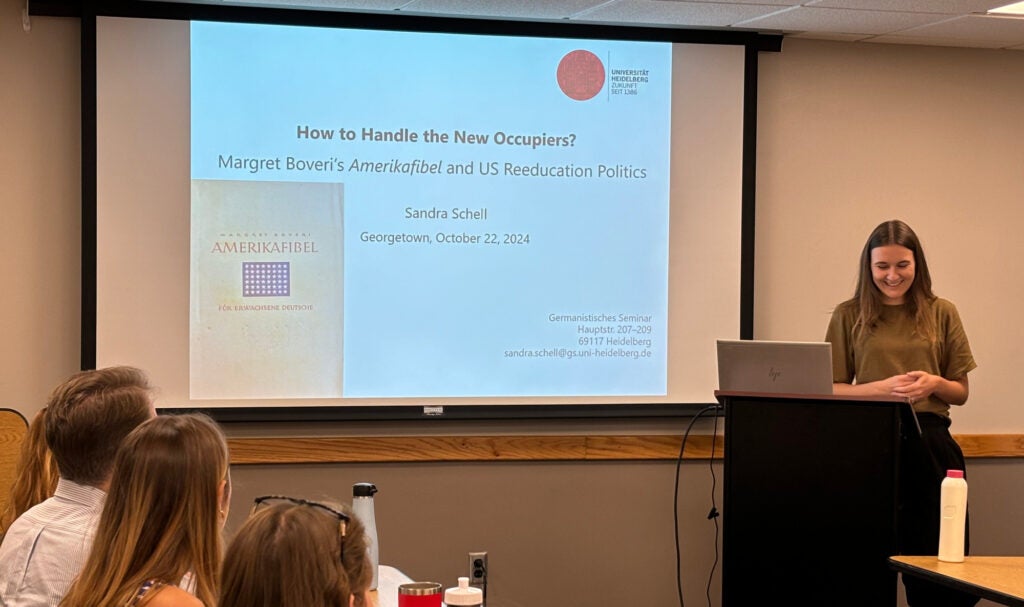
Visiting researcher Sandra Schell during her October 22 presentation
On November 1 and 2, the Digital Kafka Symposium, sponsored by the DAAD and the Georgetown German Department, took place at Georgetown University. In light of the 100th anniversary of Franz Kafka’s death, Prof. Verena Kick organized this symposium to bring together international scholars who use digital tools in their research and teaching to examine Kafka’s works. While some participants shared their digital approaches to Kafka’s texts, (including in their teaching), others examined how Kafka’s manuscripts are made available online or presented digitally in a museum.
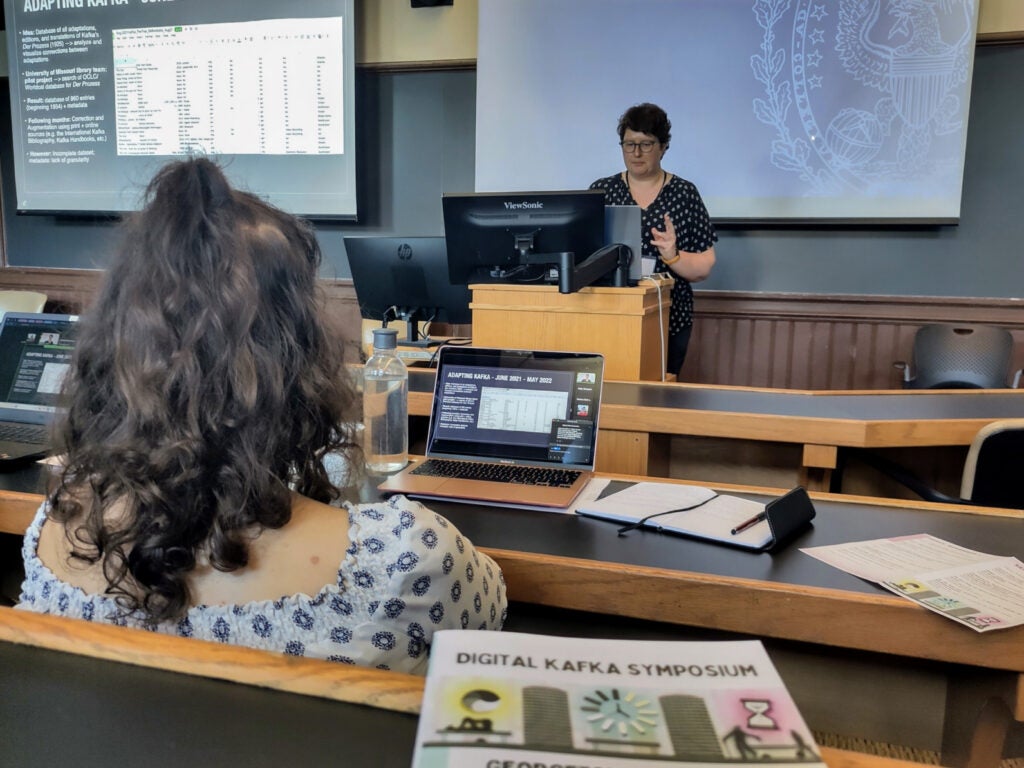
Dr. Verena Kick during the Digital Kafka Symposium
On Friday, November 1, Laura Friedrichsohn (DLA Marbach) elaborated on how the current Kafka’s Echo exhibition at the Literaturmuseum der Moderne uses digitized versions of Der Prozess to invite visitors to experience the manuscript in a virtual environment. Carolin Duttlinger (Oxford University) examined the idea of communities in Kafka’s texts and in a virtual context today, connecting it to the recent initiative by the Oxford Kafka Research Centre to connect Kafka scholars around the world (Global Kafka Network). In a panel on digital analyses and databases, Verena Kick (Georgetown) introduced Adapting Kafka. This digital project is both a database of all adaptations of Kafka’s Der Prozess and a creative publishing platform for analyses of this work. For this project, she collaborates with Carsten Strathausen (U Missouri) and Ben Mahurin (U Missouri). Ben, an undergraduate student at the University of Missouri, shared in his talk how he is contributing to the project. Carsten shared the results of his work with Andrei Kazakov, a graduate student at the University of Missouri, who used stylometry to analyze Kafka’s texts. Matt Erlin (Washington U) showed how he and his colleagues used digital approaches to compare Spanish and English translations of Kafka’s Die Verwandlung to the original text.
On Saturday, November 2, Rolf Goebel (University of Alabama, Huntsville) started the second day of the symposium with his talk: “Kafka’s Artificial Intelligence Scenarios: Audiovisual Spectacles for the Digital Age,” followed by Kiyoko Myojo’s (Seijo University) presentation of the “Myojo-Sakamoto Model.” With this model, she and her colleague, Yasuhiro Sakamoto (Shinshu University) are planning to offer an edition of Kafka’s works that is based on the application of deep learning and generative AI to his manuscripts, possibly reconstructing his writing chronology. Christian Marchlewitz (Humboldt-Universität zu Berlin) reported from his digital visits to various archives to work with Kafka’s letters that are at the center of his dissertation. Ekkehard Haring (Bundesinstitut für Kultur und Geschichte des östlichen Europa, Oldenburg) shared his work on the Kafka-Atlas, which started in 2013 and maps the global reception of Kafka. The final panel on Kafka brought us back to the use of virtual reality to offer Kafka’s texts to a new audience, as Ahlam Bavi (University of Regina) and Megan Smith (University of British Columbia) intend to do with their adaptation of Die Verwandlung through mixed reality. Focusing on using games in the classroom, Jessica Kathmann (Leibniz-Institut für Wissensmedien) shared her concept for a multi-touch tabletop game for literature classes. Martin Sheehan (Tennessee Tech University) continued with his talk “From Papers to Pixels: Kafka’s Office Life and the Procedural Rhetoric of Videogames,” and Paul Buchholz (Emory University) showed us how he and his students design games in the classroom as a way to approach Kafka’s texts.
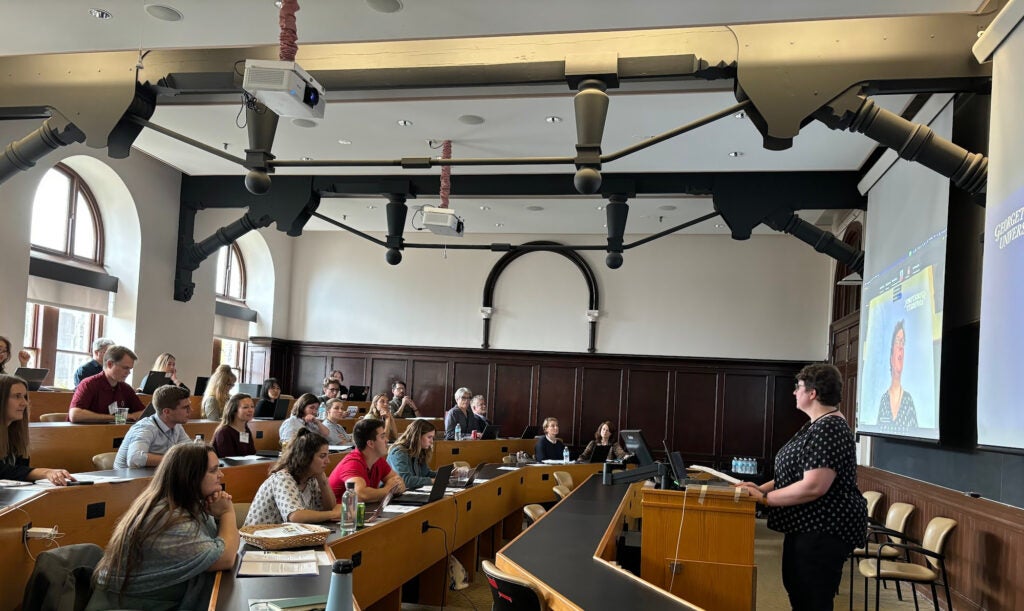
Digital Kafka Symposium participants
The Department’s events concluded for the semester with a workshop on November 15 with Dr. Huaping Lu-Adler (Philosophy Department, Georgetown University), as part of Professor Mary Helen Dupree‘s 24/25 series “Race and Enlightenment”. The title of Dr. Lu-Adler’s presentation was “What Is Seen Cannot Be Unseen: What Kant Can(not) Tell Us about Racial (Self-)Perceptions” and it examined the distinction between race concepts as representations and race concepts as tools or as political ideas serving ideological functions. The workshop examined the legacies of Immanuel Kant’s raciology in the latter terms, and was held in the newly opened Georgetown Humanities Center conference room in Old North.
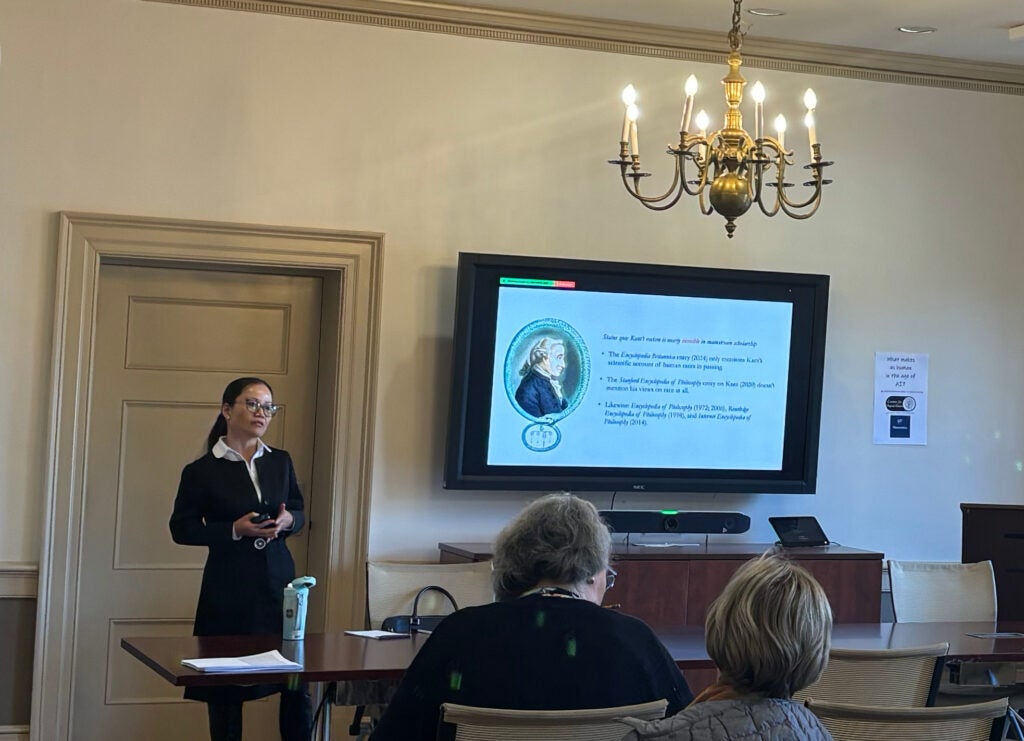
Dr. Huaping Lu-Adler during her November 15 presentation in the Humanities Center conference room
The second part of the “Race and Enlightenment” series will take place on March 21, 2025, with a workshop by Dr. Carl Niekerk (University of Illinois at Champaign-Urbana) titled “Race, Enlightenment Anthropology, and Radical Thought.”
